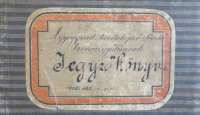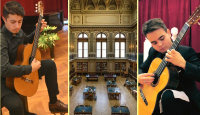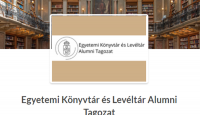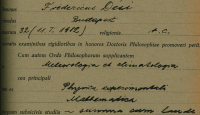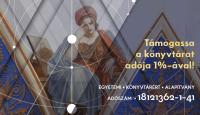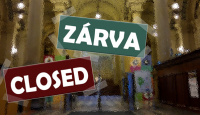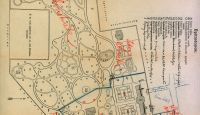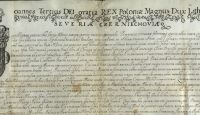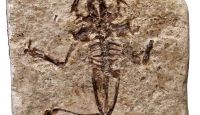Due to the Night of Museums, the library services of the ELTE University Library and Archives will be inaccessible on Saturday, on the 21st of June 2025. Everyone is welcome to join our programmes starting at 15.00.

News archive
2022. February 7., Monday – 15:12
ULA Archives
Our first special educators studied and practiced in the field of teaching deaf children in Vienna, the institute for deaf-mute people operating there since 1799. The first special education institutions in Hungary were established in the 1800s, called „philanthropic” institutions.
2022. February 7., Monday – 13:29
ULA University Library
István Ádám, Annie Fischer scholarship student of the Ministry of Human Resources, gives a guitar concert in the University Library and Archives of Eötvös Loránd University at 6.00 p.m. on the 18th of February 2022.
2022. February 4., Friday – 11:41
University Library Service (ULS)
Wiley will be running a training session on the 15th of February.
2022. February 1., Tuesday – 17:27
University Library and Arcives (ULA)
Object of the month – The flag of the ELTE Trefort Ágoston Practice High School
2022. January 31., Monday – 13:53
ULA University Library
Exclusive guided tours, library tours, recollections and many other interesting events await all former ELTE students who join our group.
2022. January 25., Tuesday – 14:27
ULA Archives
Frigyes Dési, the meteorologist and university professor was born 110 years ago, on the 11th of January 1912.
2022. January 19., Wednesday – 14:07
University Library Service (ULS)
The Education and Research Support Department of ELTE University Library and Archives announces an online training on managing research data and preparing a research data management plan.
2022. January 18., Tuesday – 13:22
ULA University Library
On the occasion of the Hungarian Culture Day (the 22nd of January 2022), the ELTE University Library and Archives invites you to a virtual library tour. This year we remember the poet, writer and journalist János Garay, who was born 210 years ago and worked in the University Library.
2022. January 18., Tuesday – 12:43
ULA University Library
The mission of the ELTE University Library and Archives, which won the Hungarian Heritage Award and – as part of the University Library Service – the title of Qualified Library in 2018, as well as the EFQM “Committed to Excellence” certificate in 2020, is to provide Hungarian and foreign academic teachers, researchers and students with domestic and foreign literature, intending to integrate them into the international circulation of scientific life. Now, you can also help to ensure free access to information, to preserve and digitize our cultural values, and to acquire modern technological equipment and implement continuous service development. Please, support the Foundation for the University Library by offering 1% of your tax!
2022. January 18., Tuesday – 12:37
ULA University Library
The ELTE University Library and Archives will be closed on the 24th of January 2022 due to technical reasons. From Tuesday (the 25th of January 2022) we are waiting for our readers according to the usual opening hours.
2022. January 14., Friday – 16:13
ULA University Library
We have collected the most frequently loaned books in the University Library over the past year.
2022. January 12., Wednesday – 16:17
ULA University Library
We would like to inform our visitors that due to the failure of the electronic storage cabinets we are temporarily unable to provide a part of the journal collection (shelfmark: between P841 and P1299). Thank you for your patience and understanding.
2022. January 12., Wednesday – 15:36
University Library Service (ULS)
ProQuest has launched its Open Access Complete e-book package, with around 2 300 books from 12 publishers freely available.
2022. January 10., Monday – 14:42
University Library Service (ULS)
School libraries belonging to the ELTE library network can catalogue their documents in various databases. While maintaining these systems, the ELTE University Library and Archives developed a common search interface in 2011 within the framework of the TÁMOP-3.2.4/09/1/KMR-2010-0021 project, which can be accessed directly at http://gimikatalogus.elte.hu.
2022. January 10., Monday – 14:11
ULA Archives
Ferenc Molnár was born on the 12th of January, 1878. His popular novel, The Paul Street Boys is laid in the Botanical Garden of the university. The plot takes place in 1889, although the novel itself was published in 1907. This year proved to be a turning point in the history of the Botanical Garden, as the Minister of Religion and Public Education ordered to hand over much of its territory to the buildings of the new clinics at the university. Pursuant to Article 48 of the 1908 Act the Margaret Island was designated as the new location for the Botanical Garden, and after the move, the former area of the Botanical Garden would have been given in its entirety to the Medical Faculty. Although plans were made to relocate the botanical garden to Margaret Island, the garden eventually continued to operate in its former location with a mutilated area. On the map made in 1901, the new border of the Botanical Garden was marked with a blue line and the location of the new buildings under construction was marked in red.
2022. January 10., Monday – 13:58
University Library Service (ULS)
The databases can be used without restriction from ELTE IP addresses. In case of remote access databases may accessed after Shibboleth authentication, or for students by using Stunnel, for instructors and for ELTE employees by using a VPN service.
2022. January 10., Monday – 11:59
ULA University Library
The ELTE University Library and Archives' new calendar 2022 presents some outstanding cultural heritage of Eötvös Loránd University, which deserve the attention not only of the university but also of the public.
2022. January 7., Friday – 12:40
ULA University Library
Medieval diplomas were available in EDIT, and now the full series, i.e. pulbications from 1527 to 1808, can also be viewed.
2022. January 5., Wednesday – 16:25
University Library Service (ULS)
The Arcanum ADT is again available to ELTE citizens in the usual ways.
2022. January 4., Tuesday – 13:08
University Library and Arcives (ULA)
Object of the month - Fossil remain of a European green toad
